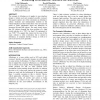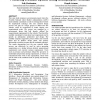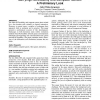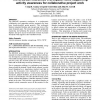NORDICHI
2004
ACM
13 years 10 months ago
2004
ACM
The concept of affordance as it applies to user interface design is widely used and accepted; possibly overused. This paper explores one of the constraints on affordance: culture....
NORDICHI
2004
ACM
13 years 10 months ago
2004
ACM
This case study examines a procurement project where the Swedish National Labor Market Administration (AMV) hired usability consultants in order to redesign their website for empl...
NORDICHI
2004
ACM
13 years 10 months ago
2004
ACM
It is critical to the success of a system that appropriate and representative users are involved in the development work. However, the process of identifying and selecting users h...
NORDICHI
2004
ACM
13 years 10 months ago
2004
ACM
The fields HCI/usability and computer games have existed for a few decades with virtually no mutual interaction. However, in recent years, a number of exchanges have appeared, bot...
NORDICHI
2004
ACM
13 years 10 months ago
2004
ACM
NORDICHI
2004
ACM
13 years 10 months ago
2004
ACM
This paper describes a new digital user study tool called Mobile Probes. Mobile Probes arose from a need to develop contextual and dynamic self-documenting tools for studying peop...
NORDICHI
2004
ACM
13 years 10 months ago
2004
ACM
This talk discusses how to strike a good balance between making the user an active co-constructor of system functionality versus making a too strong, interpretative design that do...
NORDICHI
2004
ACM
13 years 10 months ago
2004
ACM
Systems development is replete with projects that represent substantial resource investments but result in systems that fail to meet users’ needs. Evidence-based development is ...
NORDICHI
2004
ACM
13 years 10 months ago
2004
ACM
Mission Queen Maud Land (MQML) is a collaborative virtual environment that was developed to explore new ways to stimulate secondary school pupils to collaborate in grasping comple...
NORDICHI
2004
ACM
13 years 10 months ago
2004
ACM
The BRIDGE awareness workspace is a synchronous collaborative tool supporting activity awareness for longterm (weeks/months) group projects. This workspace features integrated tim...




